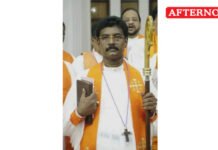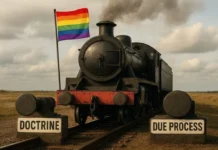Faisalabad: On September 3rd, a disturbing incident unfolded in Faisalabad, casting a spotlight on the vulnerability of religious minorities in the region. The target of this violence was none other than Presbyterian Pastor Eleazar Sindhu, also known as Vicky, who faced an attack for his decision to remove Islamic writings from the external wall of his church. The incident occurred as Pastor Vicky, accompanied by his colleague John Masih, was returning home to Rehmat Town after conducting a church service in the nearby village of Kariwala, Chak No. 100.
Recounting the event, Pastor Vicky shared that during a break, a man with a beard abruptly confronted him, demanding that he recite the Kalma (the Islamic declaration of faith). However, instead of complying, Pastor Vicky began reciting the Apostle’s Creed. This action angered the Muslim man, who then fired a shot at him and quickly fled the scene. Calling out to his colleague John for assistance and with the arrival of onlookers, the emergency service 15 was called. Pastor Vicky was promptly transported to Civil Hospital for medical treatment. Thankfully, Pastor Vicky survived the gunshot wound and is now in stable condition.
The motive behind this attack stems from Pastor Vicky’s decision to erase Islamic writings from the front wall of the Satyana Road Presbyterian Church. On August 28th, a church member informed him that Arabic writings had been inscribed on the church wall. Upon inspection, Pastor Vicky discovered Islamic text accompanied by derogatory remarks directed at him, reading “Vicky ملعون” (Maloon), which translates to “Execrable” in English.
The news of the incident quickly spread in the area, causing fear and anxiety among the local Christian community. This raised concerns about the safety of Pastor Vicky, his congregation, and fellow Christians in the vicinity. Pastor Vicky disclosed that at least four churches of their denomination had already been destroyed in Jaranwala.
Responding to the situation, Pastor Vicky and his congregation reported the incident to the local police on the same day. A police team arrived on-site and decided to personally remove the inscriptions from the church wall. However, aware of potential repercussions, Pastor Vicky recorded a video message beforehand. In the video, he showcased that neither he nor any other church member was responsible for the removal; instead, the task was being carried out by Muslim police officers. He also addressed the situation, emphasizing that religion should be promoted through actions and treatment to others, rather than coercion.
The video footage captured the moment a police officer applied paint to the inscriptions on the church wall. This step aimed to de-escalate the situation and prevent further complications. Despite the intended outcome, those attempting to sow chaos faced a setback, as their intended target shifted.
In his hospital statement, Pastor Vicky revealed that he recognized the assailant who shot him upon seeing him. The same individual had threatened him a few days earlier.
While Pastor Vicky is currently out of immediate danger, the incident underscores the persistent risks and obstacles endured by religious minorities in the region. This occurrence is not isolated but follows the August 16th attack in Jaranwala, where at least 25 churches were targeted, and false blasphemy allegations were lodged against Christians. Despite the police’s diligent efforts to restore stability in Jaranwala and its surroundings, Christians remain cautious and are hesitant to return to their homes, despite assurances from law enforcement.
The attack on Pastor Vicky has reignited concerns and propagated a sense of fear among the local Christian community. It’s essential for both the police and the government to intensify their endeavours to reestablish peace and security in Jaranwala and the adjacent areas.
Nasir Saeed, Director of CLAAS-UK, strongly condemned the assassination attempt on Pastor Eleazar and called for justice against those responsible for both defacing the church wall and targeting him. He voiced his strong opposition to the escalating instances of blasphemy allegations against Christians and the consequent harassment they endure in the name of religion. Saeed emphasized the urgency to put an end to such actions and urged the government to take robust measures to counter the intensifying hostility directed at Christians. He underscored the government’s duty to firmly address individuals who propagate hate, potentially necessitating the reinforcement of legal measures. Protecting all citizens, particularly the vulnerable religious minorities, stands as a paramount responsibility for the government.
Saeed further said that these incidents reflect a systematic campaign aimed at compelling Christians to leave Pakistan. He characterized these acts as part of a broader plans that seeks to eliminate Christianity from the country—a disconcerting trend he referred to as the gradual genocide of Christians in Pakistan. He stressed the need for swift, unyielding action to prevent irreversible outcomes.
The Christian leadership had supported Quaid-e-Azam’s vision of a separate Pakistani state, where equal citizenship rights were promised. Regrettably, Christians have never been treated as equals in Pakistan. They are now being coerced to flee, with their towns and churches set ablaze, yet justice remains elusive. Monetary compensation alone is insufficient; thorough investigations into incidents are necessary, and perpetrators must be brought to justice to deter further attacks.
In light of these events, the recommendations of investigations, whether through Joint Investigation Teams (JIT) or judicial commissions, must be diligently implemented.
Quaid-e-Azam had envisioned a modern democratic welfare state, where religion was separated from state affairs. Unfortunately, ongoing attempts persist to transform Pakistan into a theocratic state—directly opposing Quaid-e-Azam’s vision. Saeed urged Pakistan to make a decisive choice between upholding a democratic structure or embracing a theocratic model for the nation’s future.



